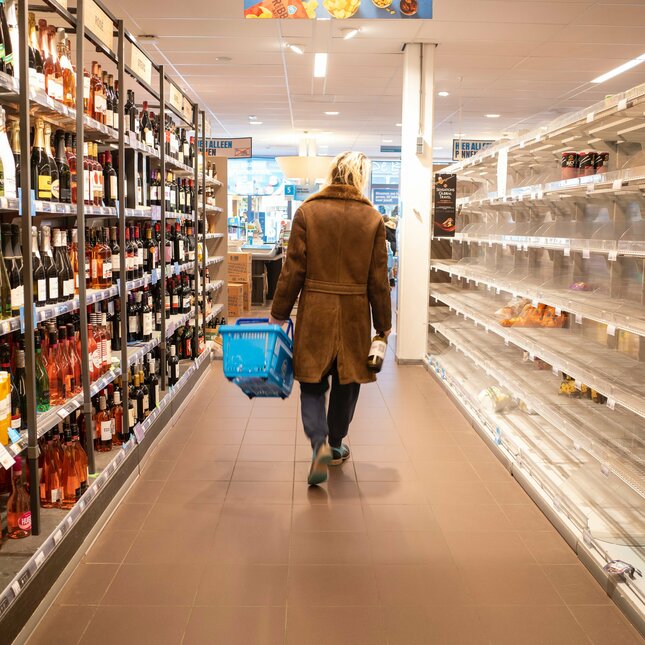The 4TU.Resilience Engineering community is entering its next stage and to underline that the 4TU.RE centre is simultaneously cultivating and leveraging its potential, we publish a series of interviews addressing RE ambitions for the near future. In this first article, we explore how personal research interests change over time, influenced by the 4TU.RE community, with Ahmadreza (Reza) Marandi, assistant professor in the Operations Planning Accounting & Control group, at TU Eindhoven.

Robustness at the heart of resilient systems
At the heart of the conversation with Reza, is the definition of resilience of the UN: "Resilience is the ability of a system, community or society exposed to hazards to resist, absorb, accommodate to and recover from the effects of a hazard in a timely and efficient manner, including through the preservation and restoration of its essential basic structures and functions."
Reza: "I think it's important that we are on the same page when it comes to understanding resilience and it's a major inspiration for my scientific work. To me, a resilient system is a system that can handle stress, and has the ability to evolve. This system has robustness against some level of stress and is able to adapt after disruptive events took place."
During his PhD, at Tilburg University, Reza started working on the concept of robustness. "I tried to design systems that can deal with stress. During this work I found that it was very interesting to work on robustness for shocks. The arrival of Covid-19 was an unexpected, disruptive event and it was, from a research perspective, interesting to see how the consequences for the supply chain unfolded in the period 2020-2021."
How practical consequences of disruptive events became part of research
Before the disruption of Covid-19 happened, practitioners used to say their systems were fine. It was hard for Reza to convince them otherwise, so his research was quite theoretical. Since Covid-19, a number of other disruptive events took place, each bringing new uncertainties to the supply chain. For example, the blockage of the Suez channel by containership the Ever Given in 2021, and the invasion of Russia in the Ukraine in 2022. These different types of disruptions were the cause to actually take some actions and to apply the theoretical knowledge from mathematical optimization.

"Perhaps surprisingly," says Reza, "some examples of robust systems were also found. For one, the sunflower oil system proved to be robust. There was a huge uncertainty in the beginning, but the system proved to be able to absorb shocks. Eventually, there were not many issues in the availability of sunflower oil. However, this proved not to be the case with the oil and gas supply systems. Many years ago, when the gas supply systems were designed, disruptions were not considered, as we painfully became aware."
Venturing out from supply chain optimization to food security
Working at the Eindhoven University of Technology means being close to industry, such as ASML. Reza is collaborating with ASML and many other companies. All these projects are centred around decision-making, artificial intelligence (AI), and incorporating implicit expertise of machine operators. In the meanwhile, Reza is venturing out in a different direction. Food systems is a new field that Reza has grown interested in over the past year.
During the 4TU.DeSIRE research programme, Reza realized that there is an enormous benefit to take expertise from one field of science and make combinations with other fields of science, and that there's a benefit for society as well. Taking on a Resilience Engineering perspective to look at different disciplines was encouraged and enabled during the duration of the 4TU.DeSIRE programme and now sits in the DNA of the 4TU.Resilience Engineering community. Reza talked a lot with the working groups Urban Resilience and Agri / Food. Food systems, food security, and taking a supply chain perspective seemed to make the most sense to Reza. "I talked a lot with George van Voorn and Els Weinans. From what I have learned by talking to them, I am now able to use while supervising a PhD project together with colleagues from HEC Montréal. This project aims to reduce the food waste in a production company by using side stream products and design new supply chain systems."
Reza gives the example of the cauliflower. We only see the head, or curd, itself. However, the stem and the leaves are also edible and are highly nutrient, and we waste this away by using it for cattle feed. Seen from a global food security point of view, we could improve this situation and provide more people with nutritious food, while improving our resource management and environmental sustainability. This calls for designing the food supply chain anew, taking a new stand of what is called 'the side stream' of the food supply chain in which waste can be reduced. Reza says: "I can see that my colleagues within the 4TU.RE community have knowledge of food and the system, whereas I have knowledge of mathematical decision making models. I really believe that working together has an impact, on science as well as society at large."
I would like to make a tool that is strong from a mathematical perspective and appreciated by practitioners.
Ahmadreza Marandi
Going beyond machine learning
Working together with ASML on supply chain challenges and working in the area of food security might not be that different after all. Reza: "What I am interested in is to take uncertainties, robustness, decision-making tools and supply chain systems in one perspective. However, dealing with uncertainties is like a beast that has multiple heads, you always find something unexpected.
In designing decision-making tools, we make use of big data, machine learning, etc. However, machine learning falls short of incorporating uncertainties and unpredictable events, because these events haven't happened yet. So therefore, I look at robustness as an important aspect in a resilient system. Robustness can be defined in a system as a way of telling us how to respond to disruptive events. This is where machine learning can help us, by suggesting how to respond to different scenarios.
In this line of thinking, you want to consider what kind of specifications do you incorporate in the system to deal with uncertain extreme events. We could prepare for certain consequences of extreme events, for example an earthquake, such as shortage of supply, unavailability of a route, blockage of routes. Some of these effects can be predicted and therefore we could already incorporate some policies in the system to deal with the fall out of parts of the supply system.
Still, dealing with uncertainties remains difficult. We need to invest to make systems robust, even though a disruption might never happen. This is similar to what we do with insurances: we try to make an educated guess where we should invest and we try to distribute the burden of investment evenly across the system."

A nexus-approach to push for real solutions
One example of how to respond to unpredictable events is how ASML dealt with Covid-19. Reza: "ASML was affected by Covid, but significantly less than others, they kept collaborating with other partners involved. To me it seemed that they didn't completely focus on their production, but people at ASML focused on working together with their suppliers. On the long term this is working on trust. Interestingly, trust is not considered in mathematical models. The knowledge of people is not incorporated in tools. It is implicit knowledge and at the same time it is tremendously important to consider in decision-making. So, I ask myself, how can we build this into a system? This is precisely the reason why I think it is important to reach out to colleagues in other disciplines to work together."
When asked about his plans for the near future, Reza's mission comes out clear and concise: "When it comes to Resilience Engineering, I want to develop a tool that can benefit the decision maker. I want to design it in such a way that it is robust and can help design policies that support how to react on extreme events. This is beneficial for both society and academia. And this is extremely hard to do. There is a high mathematical complexity. Therefore, I would like to work on projects incorporating mathematicians, practitioners to validate the tool, etc. Let's work together to develop systems that are robust. In the future I will move to incorporate more aspects and the evolution aspect of resilient systems."
Reza: "When I think about the future of my work, of science and the societal challenges, then it is about getting out of your comfort zone. When I started in DeSIRE I was a solo player, now I have learned a lot during my tenure track and work with colleagues with different scientific backgrounds and take on new challenges. To me that is the way forward! Combinations are helpful to push for real solutions of challenges."







